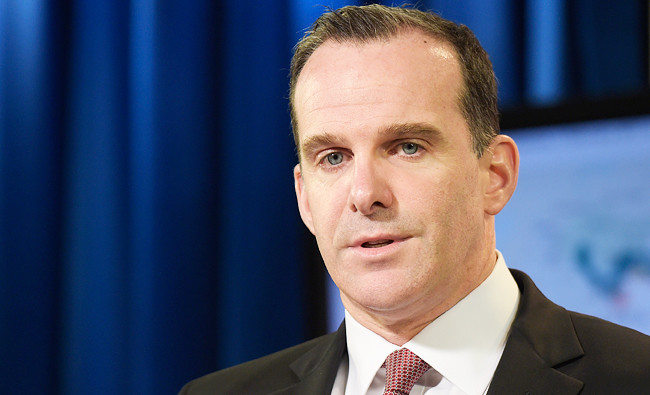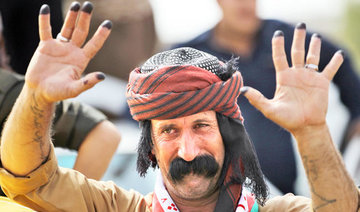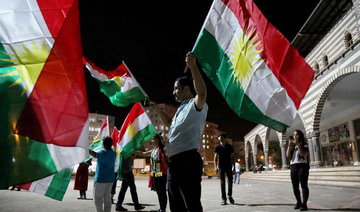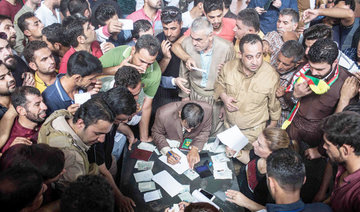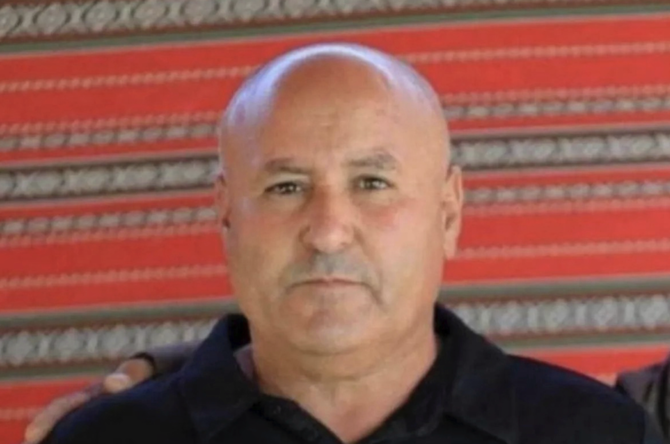IRBIL, Iraq: The United States says it’s “deeply disappointed” that Iraqi Kurds held a referendum on independence Monday, calling the vote “unilateral.”
State Department spokeswoman Heather Nauert says the move will “increase instability and hardships” for the Kurdish region of Iraq. She says it will also complicate the ability of the regional Kurdish government to work with Iraq’s central government and neighboring countries.
Still, Nauert says the US won’t alter its “historic relationship” with Iraqi Kurds because of the referendum.
Nauert also says the US opposes moves by any parties to change boundaries in Iraq. She says the Daesh group and other extremists are hoping to “exploit instability and discord.”
The vote has deeply alarmed Iraq’s government as well as neighboring Turkey and Iran. The nonbinding vote is expected to pass overwhelmingly.
The United Nations warns of the “potentially destabilizing” effects of the referendum carried out in Iraq’s Kurdish region Monday.
The statement from the organization’s secretary general released after polls closed Monday says “all outstanding issues between the federal government and the Kurdistan Regional Government should be resolved through structured dialogue and constructive compromise.”
The vote in a referendum on support for independence Monday has rattled the region’s relations with Baghdad and regional powers.
The vote is non-binding and not expected to result in immediate independence, but Kurdish leaders say it will open the door to negotiations with Baghdad for greater autonomy.
Turkey’s military has confirmed that Turkey and Iraq will conduct joint military drills in Turkey, along an area bordering Iraq’s semi-autonomous Kurdish region.
A military statement on Monday announced a new “phase” in the military exercises that were launched last week in a clear warning to Iraqi Kurds, saying units from Iraq’s armed forces would arrive in Turkey later in the evening to join Turkish troops.
The joint drills are set to kick off Tuesday, the military said, without providing details.
The Turkish military also published photographs of Iraqi troops, including one showing them holding the flags of Turkey and Iraq and posing in front of an Iraqi Air Force plane.
Iraq’s ministry of defense says it’s launching “large scale” joint military exercises with Turkey along their shared border.
The announcement Monday night followed the closing of polls in the controversial Kurdish referendum on independence from Iraq that both Baghdad and Ankara spoke out against.
Earlier Monday From Istanbul, Turkish President Recep Tayyip Erdogan threatened military intervention in Iraq in response to the vote, stressing that Kurdish independence was unacceptable to his country.
Polls have closed across Iraq’s Kurdish region and in disputed territories where residents cast ballots in a referendum on support for independence, according to local television broadcasts.
The vote is not binding and is not expected to result in independence any time soon, but was hailed as historic by Kurdish leaders spearheading the campaign.
The vote is widely expected to be an overwhelming “yes” in support for independence and initial official results are expected on Tuesday.
The head of the Kirkuk police department says the governor has imposed a curfew in the Iraqi city following the closing of polls in a controversial referendum on Kurdish independence.
Brig. Sarhad Qader says the curfew was imposed Monday night to “protect the civilians and the communities” in the city claimed by both Baghdad and the Kurdish region.
Iraqi Kurds voted in a referendum on support for independence Monday despite calls from Baghdad and the international community to call off the vote, fearing it could lead to instability and the outbreak of violence.
Qader says the curfew will be lifted at 6 a.m. on Tuesday.
Turkish President Recep Tayyip Erdogan and Russia’s Vladimir Putin have spoken over the phone about the contentious Iraqi Kurdish vote in support for independence and stressed the importance of Iraq and Syria’s territorial integrity.
Erdogan’s office said after Monday’s phone call that Putin would visit Ankara on Thursday to discuss developments in the region, including the Kurdish referendum. There was no immediate confirmation from Moscow.
Turkey, which has a large Kurdish population of its own and is fighting insurgents on its territory, strongly opposes any moves toward the creation of a separate Kurdish state.
Erdogan earlier in the day threatened the Iraqi Kurds with military action as well as sanctions, including cutting the Iraqi Kurdish region’s oil exports.
An Iraqi lawmaker says the country’s parliament has approved several tough measures in response to the Iraqi Kurds’ contentious vote on support for independence from Baghdad.
Shiite lawmaker Hakim Al-Zamili says the measures will force Baghdad to act to “protect Iraq’s unity and to deploy troops in all areas” where they were before the 2014 blitz by the Daesh group.
Al-Zamili says measures approved on Monday also call for closing all border crossings with the Kurdish region.
He says the parliament considers the Kurdish referendum unconstitutional and calls for taking legal measures against all Kurdish officials and employees who took part in the vote.
The referendum on independence is non-binding, but it has strained tensions with Baghdad and regional powers. The United States has strongly opposed the move, saying it could destabilize the region.
Syria’s foreign minister says his country doesn’t recognize the Iraqi Kurdish referendum on support for independence from Baghdad, saying Damascus rejects any measure that could break up neighboring Iraq.
The Syrian state news agency SANA says Walid Al-Moallem spoke on Sunday in New York. Syria’s has a large Kurdish minority that last week had its own vote as part of a move toward a federal system within Syria.
Syria, like Turkey and Iran, opposes the vote in Iraq, fearing that Kurdish communities within Syria might eventually do the same.
Al-Moallem described the Iraqi Kurdish vote as a “step that we do not recognize” and stressed that the government in Damascus only recognizes a “sole, united Iraq. He says: “We reject any measure the leads to dividing Iraq.”
Turkish President Recep Tayyip Erdogan is threatening a military intervention in Iraq in response to the Iraqi Kurdish region’s referendum on independence from Baghdad.
Erdogan, speaking at a conference in Istanbul as Iraqi Kurds voted in their region on Monday, said that Kurdish independence was unacceptable to his country and that this was a “matter of survival.”
He pointed to Turkish military exercises currently taking place on Turkey’s border with the Iraqi Kurdish region.
Erdogan said: “Our military is not (at the border) for nothing.” He also added: “We could arrive suddenly one night.”
Erdogan also said Turkey would take political, economic as well as military measures against Iraqi Kurds’ steps toward independence and also suggested that Turkey could halt oil flows from a pipeline from northern Iraq.
Erdogan said: “Let’s see where — and through which channels — will they sell their oil. We have the valve. The moment we shut the valve, that’s the end of it.”
Erdogan said a border crossing with Iraq had been closed in one direction and that Turkey would shut it entirely.
Turkish Prime Minister Binali Yildirim says his country is considering closing down its airspace as well as a border gate to northern Iraq, in response to a referendum on independence in Iraq’s Kurdish region and disputed territories — a vote that Turkey strongly opposes.
Yildirim also said on Monday that officers and experts from Iraq’s army would join military exercises that Turkey launched along the border in an apparent warning to the Iraqi Kurds.
The Turkish premier said Ankara would from now on “enter a strong” dialogue with Baghdad, saying it regarded the central government in the Irai capital as the legitimate authority over border crossings, airports and oil trade in the Kurdish region.
He says Turkey had received a formal request from Baghdad requesting the closure of the airspace and border crossing. Yildirim also suggested that Turkey would take action if the Turkmen population came under attack or if Turks encountered “obstructions or problems” at the border crossing.
Iran has described the Iraqi Kurdish referendum on support for independence from Baghdad as “untimely and wrong” and reiterated its support for Iraq’s territorial integrity.
Foreign Ministry spokesman Bahram Ghasemi told reporters on Monday that the vote could “lead to developments and happenings that could affect all people of the region and especially Kurdish people.”
Ghasemi reiterated that Iran supports the “territorial integrity and democratic process” in Iraq.
Since Sunday, Iran’s powerful Revolutionary Guard has been having a military exercise in its northwestern Kurdish region bordering Iraq in a sign of Tehran’s concerns over the Iraqi Kurdish vote.
Iran’s semi-official ISNA news agency reported that on Sunday that the Supreme National Security Council closed Iranian airspace to the Iraqi Kurdish area at the request of the central government in Baghdad.
Iran and Iraq have been close allies since the 2003 US-led invasion of Iraq toppled dictator Saddam Hussein. Both are opposed to Kurdish independence.
In June, the country’s Supreme Leader Ayatollah Ali Khamenei told visiting Iraqi Prime Minister Haider Al-Abadi, that Iraq “should remain integrated” and that advocates of Kurdish independence are “opponents of the independence and identity” of Iraq.
The prime minister of Iraq’s northern Kurdish region says the referendum on independence that is underway there doesn’t mean “redrawing borders” and will not result in immediate independence.
Nechirvan Barzani says that even if the result of the vote is a “yes,” the region will resolve its disputes with Baghdad peacefully. He spoke at a press conference on Monday morning in Irabil, the Kurdish regional capital.
Voting is taking place across the region and in disputed territories claimed by both Baghdad and the Kurds, including the oil-rich city of Kirkuk.
The referendum on independence, while non-binding, has strained tensions with Baghdad and regional powers. The United States has come out strongly opposed to the move, cautioning that it could distract from the ongoing fight against the Daesh group.
In Baghdad, residents have strongly criticized the Iraqi Kurds’ independence referendum, saying it would raise sectarian tensions and create an “Israel in Iraq.”
An Arabic newspaper headline on Monday said “Kurdistan into the unknown,” a reference to the name Kurds use for their region.
Journalist Raad Mohammad said the vote represents a “division of Iraq,” and added that it was “unacceptable for the Iraqi people as well as many other countries.”
Another Baghdad resident, Ali Al-Rubayah, described the referendum as a “black day in the history of the Kurds,” adding that “today, the Kurds are trying to make an Israeli state in the north of Iraq.”
Lawyer Tariq Al-Zubaydi said the referendum was inappropriate amid the “ongoing threat of terrorism and Islamic State” and that a “unified country is better for all.”
Turkey says it doesn’t recognize the Iraqi Kurdish region’s referendum on support for independence from Baghdad and insists its results will be “null and void.”
Turkey’s Foreign Ministry released a statement as polls opened in Iraq’s Kurdish-run provinces and disputed territories on Monday, with Ankara calling on the international community — and especially regional countries — not to recognize the vote either.
It also urges Iraq Kurdish leaders to abandon “utopic goals,” accusing them of endangering peace and stability for Iraq and the whole region. The ministry reiterated that Turkey would take all measures to thwart threats to its national security.
On Saturday, Turkey’s parliament met in an extraordinary session to extend a mandate allowing Turkey’s military to send troops over its southern border if developments in Iraq and Syria are perceived as national security threats.
Polls have opened in Iraq’s Kurdish-run provinces and disputed territories as Iraqi Kurds cast ballots in support for independence from Baghdad in a historic but non-binding vote.
Millions are expected to vote on Monday across the three provinces that make up the Kurdish autonomous region, as well as residents in disputed territories — areas claimed by both Baghdad and the Kurds, including the oil-rich city of Kirkuk.
The vote is being carried out despite mounting regional opposition to the move. The United States has warned the vote will likely destabilize the region amid the fight with the Daesh group.
Baghdad has also come out strongly against the referendum, demanding on Sunday that all airports and borders crossings in the Kurdish region be handed back to federal government control.


